

ASHA Leader Articles. AudiologyOnline APD. Auditory Processing Disorder International Research. NZ APD GUIDELINES 2019. Abnormal Cortical Processing of the Syllable Rate of Speech in Poor Readers. Introduction Reading proficiency relies on the confluence of rudimentary perceptual abilities and higher-order linguistic function (Schlaggar and McCandliss, 2007).
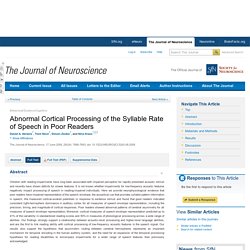
While normal reading is thought to rely on an array of abilities, it is widely thought that reading-impaired individuals suffer from a specific deficit in representing or recalling the precise phonological structure of words (Ramus, 2001). This “phonological deficit” is thought to impair reading acquisition: if the mental representation of individual speech sounds is impaired, then the necessary step of learning how to match these sounds on to letters will also be impaired. While it is widely accepted that impaired readers suffer from a phonological deficit, it is not known what causes this deficit.
Recent work has provided insight into neural mechanisms governing temporal processing of speech in the unimpaired human auditory system. Results Cortical envelope representation in “good” and “poor” readers Figure 1. Figure 2. A European Perspective on Auditory Processing Disorder-Current Knowledge and Future Research Focus. Introduction Hearing loss (HL), i.e., reduced pure tone sensitivity affects over 5% of the world’s population (1) and is the fifth leading cause of Years Lived with Disability, a component of the Disability-Adjusted Life Year, used to measure the global burden of disease (2).
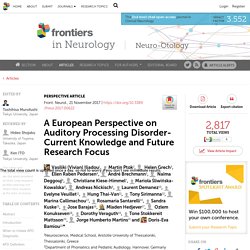
This hearing impairment, however, does not include the children and adult individuals who have normal hearing sensitivity but who experience auditory processing difficulties in everyday life that are reflected in reduced performance in other audiometric tests such as speech in noise or complex non-speech sound perception (3). APDFacts Index. APD Foundation - Auditory Processing Disorder. Apd booklet clearing the waters 4. Apd_report.pdf. APD Steering Committee Members - British Society of Audiology. APD Steering Committee Members The APD SIG promotes a high standard of research and evidence-based care and encourages international and interdisciplinary collaboration.
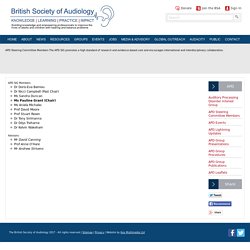
APD SIG Members Dr Doris-Eva BamiouDr Nicci Campbell (Past Chair)Ms Sandra DuncanMs Pauline Grant (Chair)Ms Aniela MichalecProf David MooreProf Stuart RosenDr Tony SirimannaDr Dilys TreharneDr Kelvin Wakeham Advisors: (Central) Auditory Processing Disorder (APD) Support, Awareness & Advocacy in the U.S. A Place of Our Own: Auditory Processing Disorder. An auditory processing disorder (APD or CAPD) is a disorder in “how” auditory information is processed in the brain.
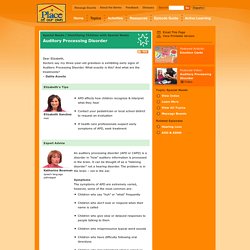
It can be thought of as a “listening disorder” not a hearing disorder. The problem is in the brain – not in the ear. Symptoms The symptoms of APD are extremely varied, however, some of the most common are: Children who say “huh” or “what” frequently Children who don’t look or respond when their name is called Children who give slow or delayed responses to people talking to them Children who mispronounce typical word sounds Children who have difficulty following oral directions Children who misunderstand what is asked or said to them …these children usually answer off topic or don’t answer at all.
APD can not be formally diagnosed by an audiologist until age 7 years, when the auditory system has maturated (fully developed). Auditory Neuroscience Laboratory Publications. Dissertations Awards Community Outreach For Clinicians.
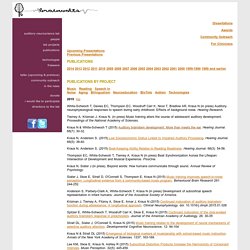
Auditory Or Visual Processing. Children who have Sensory Processing Disorder will almost always have, to various degrees, some level of auditory or visual processing deficits.
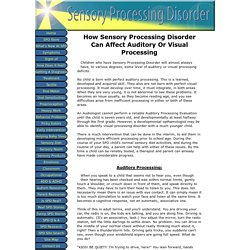
No child is born with perfect auditory processing. This is a learned, developed and acquired skill. They also are not born with perfect visual processing. It must develop over time, it must integrate, in both areas. When they are very young, it is not abnormal to see these problems. Auditory Processing - What is It? (Hearing vs. Processing) - NACD International. “Auditory processing”—We are hearing this term be referenced more and more, and an increasing number of children are being identified as having an ” auditory processing disorder.”
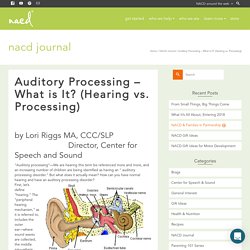
But what does it actually mean? How can you have normal hearing and have an auditory processing disorder? First, let’s define “hearing.” The “peripheral hearing mechanism,” as it is referred to, includes the outer ear—where sound waves are collected, the middle ear—where sound is converted to mechanical energy, and the inner ear—containing the cochlea. Traditional hearing tests (audiograms) and tympanograms assess the integrity of this system. But what happens when the signal leaves the inner ear? Auditory Processing. By Laura Dyer, Author of Look Who's Talking!
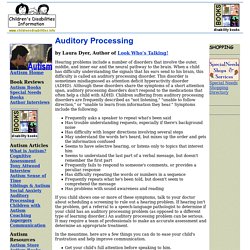
Hearing problems include a number of disorders that involve the outer, middle, and inner ear and the neural pathway to the brain. When a child has difficulty understanding the signals that his ears send to his brain, this difficulty is called an auditory processing disorder. This disorder is sometimes misdiagnosed as attention deficit hyperactivity disorder (ADHD). Although these disorders share the symptoms of a short attention span, auditory processing disorders don't respond to the medications that often help a child with ADHD.
Children suffering from auditory processing disorders are frequently described as "not listening," "unable to follow direction," or "unable to learn from information they hear. " If you child shows one or more of these symptoms, talk to your doctor about scheduling a screening to rule out a hearing problem. Auditory Processing. Auditory Processing Disorder Interest Group - British Society of Audiology. Who are we?
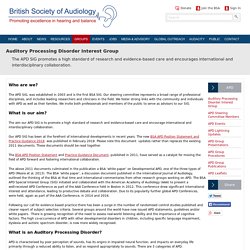
The APD SIG, was established in 2003 and is the first BSA SIG. Our steering committee represents a broad range of professional disciplines, and includes leading researchers and clinicians in the field. We foster strong links with the community and individuals with APD as well as their families. We invite both professionals and members of the public to serve as advisors to our SIG. What is our aim? The aim our APD SIG is to promote a high standard of research and evidence-based care and encourage international and interdisciplinary collaboration. Our APD SIG has been at the forefront of international developments in recent years. The BSA APD Position Statement and Practice Guidance Document, published in 2011, have served as a catalyst for moving the field of APD forward and fostering international collaboration. Auditory Processing Disorder. Listen Helping Your Child A child's auditory system isn't fully developed until age 15.
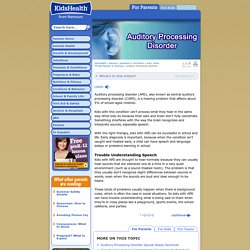
So, many kids diagnosed with APD can develop better skills over time as their auditory system matures. While there is no known cure, speech-language therapy and assistive listening devices can help kids make sense of sounds and develop good communication skills. A frequency modulation (FM) system is a type of assistive listening device that reduces background noise and makes a speaker's voice louder so a child can understand it. Auditory processing disorder. Auditory processing disorder (APD) is a hearing or listening problem caused by the brain not processing sounds in the normal way. It can affect your ability to: pinpoint where a sound is coming from tell which sound comes before another distinguish similar sounds from one another – such as "seventy" and "seventeen" understand speech – particularly if there's background noise, more than one person speaking, the person is speaking quickly, or the sound quality is poor remember instructions you've been told enjoy music Children with the problem may also have difficulty responding to sounds, understanding things they're told, concentrating, and expressing themselves with speech.
Auditory Processing Disorder (APD) Number: 0668 Policy Aetna considers any diagnostic tests or treatments for the management of auditory processing disorder (APD) (previously known as central auditory processing disorder (CAPD)) experimental and investigational because there is insufficient scientific evidence to support the validity of any diagnostic tests and the effectiveness of any treatment for APD. See also CPB 0256 - Sensory and Auditory Integration Therapy. Background. Auditory Processing Disorder. Also known as Central Auditory Processing Disorder, individuals with Auditory Processing Disorder (APD) do not recognize subtle differences between sounds in words, even when the sounds are loud and clear enough to be heard. They can also find it difficult to tell where sounds are coming from, to make sense of the order of sounds, or to block out competing background noises.
Signs and Symptoms Strategies Show rather than explainSupplement with more intact senses (use visual cues, signals, handouts, manipulatives)Reduce or space directions, give cues such as “ready?” Reword or help decipher confusing oral and/or written directionsTeach abstract vocabulary, word roots, synonyms/antonymsVary pitch and tone of voice, alter pace, stress key wordsAsk specific questions as you teach to find out if they do understandAllow them 5-6 seconds to respond (“think time”)Have the student constantly verbalize concepts, vocabulary words, rules, etc. Auditory processing disorder. Auditory processing disorder (APD), also known as central auditory processing disorder (CAPD), is an umbrella term for a variety of disorders that affect the way the brain processes auditory information.[1] Individuals with APD usually have normal structure and function of the outer, middle and inner ear (peripheral hearing).
However, they cannot process the information they hear in the same way as others do, which leads to difficulties in recognizing and interpreting sounds, especially the sounds composing speech. It is thought that these difficulties arise from dysfunction in the central nervous system. The American Academy of Audiology notes that APD is diagnosed by difficulties in one or more auditory processes known to reflect the function of the central auditory nervous system.[1] APD can affect both children and adults, although the actual prevalence is currently unknown. Presentation in adults[edit] CAPD can continue into adulthood. Definitions[edit] Auditory Processing Disorder (APD) Can NDCS support a child with APD? NDCS is an organisation that supports deaf children and their families. If a deaf child also had APD we would provide any of our usual support and services as requested by the family. However, if a child has normal hearing levels with APD we are currently unable to provide support or services.
Top What is Auditory Processing Disorder (APD)? Deafness occurs when one or more parts of the ear or auditory (hearing) nerve does not function as it should. Children with APD may have difficulties with listening, or making sense of the sounds heard, particularly in environments with a lot of background noise. Some parents realise their child has difficulties with understanding from an early age, but often APD becomes more obvious when children start at school.
The cause of APD is often unknown. AUDITORY PROCESSING DISORDER. On the 13th March 2001 my 11 year old son Andrewwas diagnosed with Auditory Processing Disorder, after about 9 years of searching we finally had a diagnosis, but where to from here with limited knowledge of this disorder as well as limited resources available in Australia. The purpose of this page is to give encouragement to other parents of children with CAPD and to share the information that I have learned. This site will hopefully serve as the basis of where to go for help and assessment within Australia, information on Auditory Processing Disorder and other related disorders. Auditory Processing Disorder (APD) Auditory Processing Disorders and the Role of the SLP (pdf) Auditory processing disorders: can they be treated? : Current Opinion in Neurology. Introduction A child is said to have an auditory processing disorder (APD) if she or he scores poorly on a test that asks them to detect, identify, discriminate, order, group, or localize sounds.
An APD is thought to affect the processing of both nonspeech and speech sounds. However, the best tests for APDs use nonspeech sounds because nonauditory factors, like language exposure or language expertise, can confound responses to speech sounds [1••]. Can a child's APD be treated? Auditory Processing Disorder in Children. Auditory Processing Disorder in Children: Facts on Treatment. Introduction. Auditory Processing Disorder Interest Group - British Society of Audiology. Auditory processing disorder. Auditory Processing Disorder.
Speech-Language & Audiology Canada. Auditory Processing Disorder, The Hidden Disability. "What? " Auditory Processing disorder. Auditory Processing Disorder Service. Auditory Processing Disorder Under IDEA. Auditory Processing Disorders (APD) : Simcoe County, ON : eMentalHealth.ca. Auditory Processing Disorder: Where to Go for Help. Do you hear what they hear? A Work Psychologist Assessment For On Adult Apd (long) Best Practices Task Force on Auditory Processing Disorders, Minnesota Speech‐Language‐Hearing Assoc. Beyond Controversies: The Science Behind Central Auditory Processing Disorder. BSA APD Management 1Aug11 FINAL amended17Oct11. BSA APD PositionPaper 31March11 FINAL. Central auditory processing: a current literature review and summary of interviews with researchers on controversial issues related to auditory processing disorders. CAPD - Central Auditory Processing Disorders and ADHD.
CAPD and the gifted child. CAPD Guidelines 8 2010.pdf 539952af956c79.73897613. CAPD, Reading, and Multiplication Tables. Central Auditory Processing Disorders. Central Auditory Processing Disorders (CAPD) Central Auditory Processing Disorder (CAPD) (Central) Auditory Processing Disorders. Central Auditory Processing Disorder. Central Auditory Processing Disorders, ADD ADHD Child Treatment, ADD ADHD Child Behavior, and ADD ADHD Medication Help.
Central Auditory Processing Disorder. Central Auditory Processing Disorder (CAPD) CAPD at National Acoustic Laboratories. Coleman CAPD/APD&ADHD Information. CONGRATULATIONS to Prof David R. Moore & APD Group - British Society of Audiology. Contemporary Issues in Auditory Processing Disorders: 2016. Contribution of psychoacoustics and neuroaudiology in revealing correlation of mental disorders with central auditory processing disorders. Eartroubles.com. Embracing the Enigma of Auditory Processing Disorder : The Hearing Journal. Environmental Modification of APD at Home. Essays in Audiology Auditory Processing Disorder - from Screening to Diagnosis and Management - A Step-by-Step Guide.pdf. "Hearing and "listening" are different auditory skills." Yahoo Group.
How's Your Hearing? Ask an Audiologist. Implementation and evaluation of a Danish test battery for auditory processing disorder in children. Issues in Cognitive Screenings by Audiologists. Listening in the workplace. Living With (Central) Auditory Processing Disorder. Living and Working with a Central Auditory Processing Disorder (CAPD) Medical Research Council (MRC) Institute of Hearing Research. MRC Institute of Hearing Research Publications. Other Sources of Reading Difficulty. Quackwatch. Papers in Audiology and Auditory Processing Disorder. Opening the door on auditory processing disorders. Raising A Child With Auditory Processing Disorder. Resources for Adults with Auditory Processing Disorder. Temporal Processing Deficits in Children with Dyslexia Deborah Moncrieff Deborah Moncrieff Literacy/Phonological Awareness CAPD/Central Auditory Processing 1485.
TAPS-3 Test of Auditory Processing Skills 3rd : Ann Arbor Publishers, leading suppliers of learning materials to psychologists and allied therapists of all disciplines - specialist teachers and parents from the UK and Worldwide. SENSORY PROCESSING DISORDER. The Daily Struggles of a Teen with APD: July 2011. UCL Search - auditory processing disorder. Understanding Auditory Processing Disorder in Children. Use of Questionnaire-Based Measures in the Assessment of Listening Difficulties in School-Aged Children. - PubMed - NCBI. What is Central Auditory Processing Disorder? Ylc - CAPD-APD Contents.